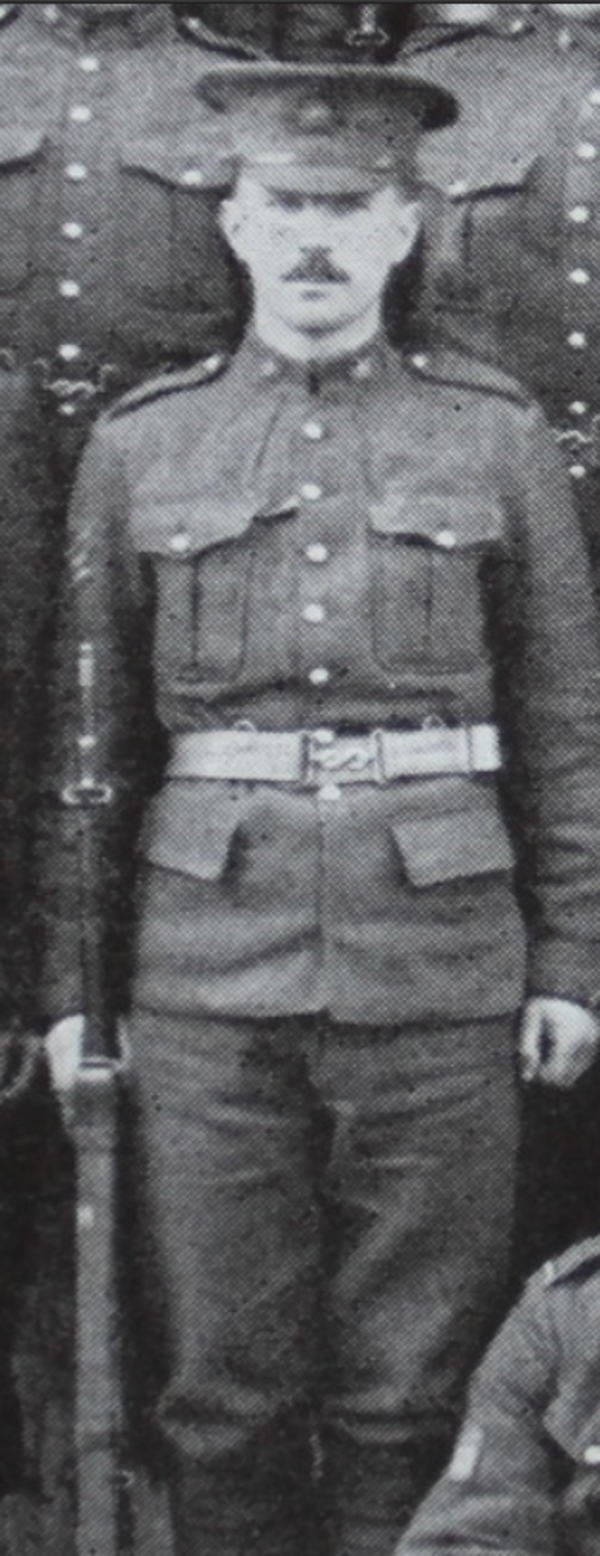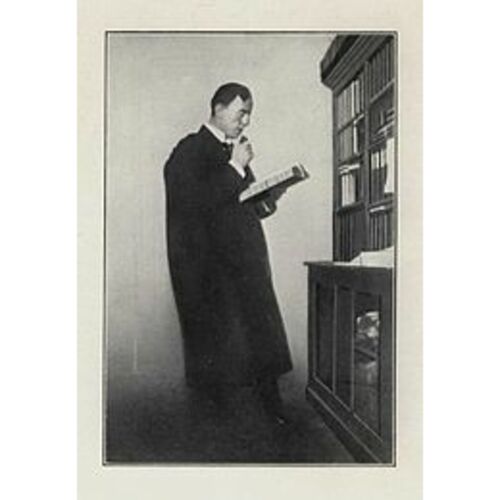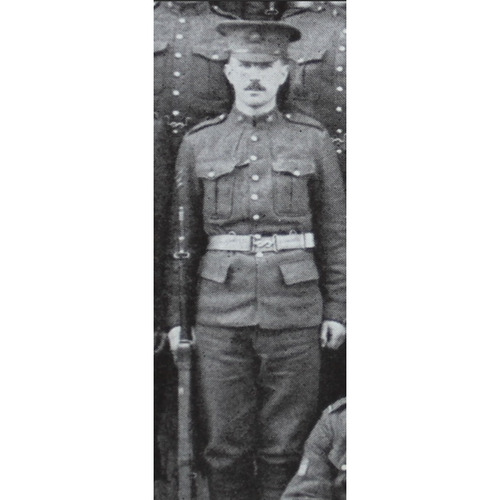
Source: Link
BATEMAN, REGINALD JOHN GODFREY, professor and army officer; b. 12 Oct. 1883 in Listowel (Republic of Ireland), son of Dr Godfrey Bateman and Frances Emily ———; d. unmarried 3 Sept. 1918 near Dury, France.
Reginald Bateman received a ba from Trinity College, Dublin, in 1906, having received awards in English, French, and modern history. In 1909 he was hired at the University of Saskatchewan in Saskatoon as its first professor of English, and one of the first four professors at the new university. He enlisted as a private in the 28th Infantry Battalion on 26 Oct. 1914, and after eleven months in training he served six months in the area around Ypres (Ieper), Belgium. He then was invited by Walter Charles Murray*, president of the University of Saskatchewan, to take command of the Saskatchewan Company of the 196th (Western Universities) Infantry Battalion, spent the summer and fall of 1916 in Canada, wrote his officer’s exams, and became a major. Once in England the 196th was broken up. Bateman reverted from major to lieutenant so that he could see action again, and was posted to the 46th Infantry Battalion, arriving at the front in June 1917. In the advance on Lens in August he was wounded at Aconite Trench but he returned to the front that winter. He was an acting captain when he was killed on 3 Sept. 1918 near Dury, during the assault on the Drocourt-Quéant Line, by a shell dropping at the entrance to battalion headquarters.
In 1922 the University of Saskatchewan brought out a memorial volume in Bateman’s honour, Reginald Bateman, teacher and soldier. The volume makes clear the kind of man and mind that went to war in 1914. He was an idealist as a teacher. “It is by Art and Art alone,” he believed, “that Humanity progresses; progress in Science or in mere knowledge does not necessarily mean progress in any of those things in which Man stands supreme above the rest of creation, those spiritual qualities which raise him to the level of the Divine.” The students he valued were those who could move in such rarefied air. Of all those he might teach (Bateman taught 220 students in 1914), if a teacher inspired “even a single individual with a true desire for culture, his existence for that year is fully justified.”
Bateman went to war as an idealist too. On 25 Oct. 1914 he addressed the Young Men’s Christian Association at the university in a speech that was more extreme than any other pro-war speech delivered to Saskatoon from platform or pulpit in the war years. War, he said, “is the one supreme, the only entirely adequate test of a nation’s spiritual quality,” and by punishing “national depravity” war is “the chief stimulus in the progress of mankind.” What is true of the nation is true of individuals: “Is it not far better that they should feel a thrill of patriotism at the rude touch of war, and die striking a blow for freedom, than that they should live to a dishonoured old age, seeking beggarly gain?” War alone, said Bateman, keeps fully alive such virtues as courage, self-sacrifice, and honour, while a world without war would be “enjoyed by a spineless and emasculated race of beings.”
Bateman followed his own beliefs and twice chose a lower rank so that he could go to war, once in 1917 but also in the winter of 1914–15. He had taken the officers’ training course at Winnipeg, passed one examination, but refused to take the final because he would have had to resign from the 28th. “He preferred to . . . not lose his chance of getting to the front at the earliest possible date.”
When Bateman returned to Saskatoon after his first tour of duty at the front, he was a different man, his idealism tempered by reality. He spoke well of the enemy, and summed up trench life as “days of unendurable monotony and moments of indescribable fear.” He added two other aspects of war to that statement – the picturesque (he describes a night in the trenches) and the comic, where the breaking of a rum jar was a greater calamity to the men than their trench being shelled, and he listened happily to creative cursing. He had heard a ration party going to the front at night, “wading through mud, plunging into holes, falling over broken trench mats, and I have heard with great pleasure the flow of language; it was immense, nothing like it is to be heard from any other troops in the world’s history.” The idealistic professor had found the common touch, though with his customary hyperbole.
He was apparently well thought of as an officer. That he should command the University of Saskatchewan company was “a very strong desire” of students. The authors of The suicide battalion say that he was “considered one of the most popular officers in the 46th.” He was much honoured at the university, by the book but also by a scholarship in his name and by the Bateman professorship of English.
Reginald Bateman was in his life and writings a serious man. He had another side to him. While sitting his officer’s examinations at Winnipeg so that he could take command of the Saskatchewan Company, Bateman received a new uniform. “I have just received my uniform. It is a trifle loud. It is downstairs but I can still hear it calling me. I have posted a picket over it to prevent its escape, until the cleaning man arrives to take it in charge. I think it will go quietly.”
Reginald Bateman, teacher and soldier: a memorial volume of selections from his lectures and other writings was published in London in 1922. Bateman’s lecture notes are preserved in the Bateman fonds at the Univ. of Sask. Arch. (Saskatoon), MG 5.
NA, RG 150, Acc. 1992–93/166. Univ. of Sask. Arch., RG 1, ser.1 (presidential papers, W. C. Murray), 18, file B.8 (applications and appointments); 60, file B.124 (Western Universities Battalion: organization). “Memorial service for Capt. Reginald J. G. Bateman,” 13 Oct. 1918 (copy in the contributor’s possession). J. L. McWilliams and R. J. Steel, The suicide battalion (Edmonton, 1978).
Cite This Article
Donald Cameron Kerr, “BATEMAN, REGINALD JOHN GODFREY,” in Dictionary of Canadian Biography, vol. 14, University of Toronto/Université Laval, 2003–, accessed February 25, 2026, https://www.biographi.ca/en/bio/bateman_reginald_john_godfrey_14E.html.
The citation above shows the format for footnotes and endnotes according to the Chicago manual of style (16th edition). Information to be used in other citation formats:
| Permalink: | https://www.biographi.ca/en/bio/bateman_reginald_john_godfrey_14E.html |
| Author of Article: | Donald Cameron Kerr |
| Title of Article: | BATEMAN, REGINALD JOHN GODFREY |
| Publication Name: | Dictionary of Canadian Biography, vol. 14 |
| Publisher: | University of Toronto/Université Laval |
| Year of publication: | 1998 |
| Year of revision: | 1998 |
| Access Date: | February 25, 2026 |




